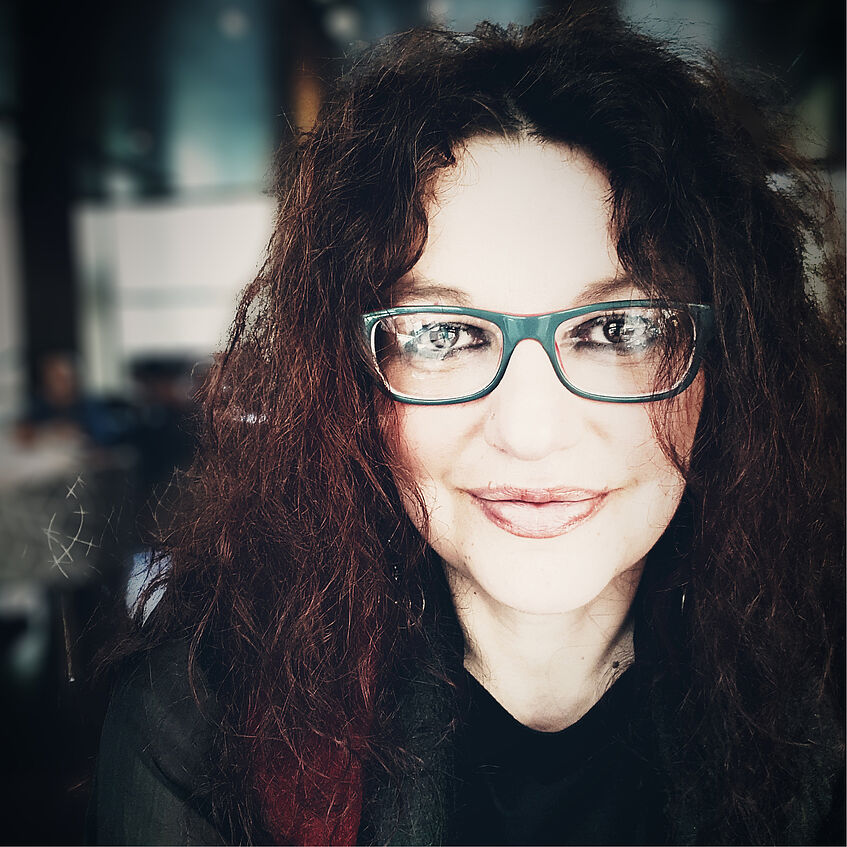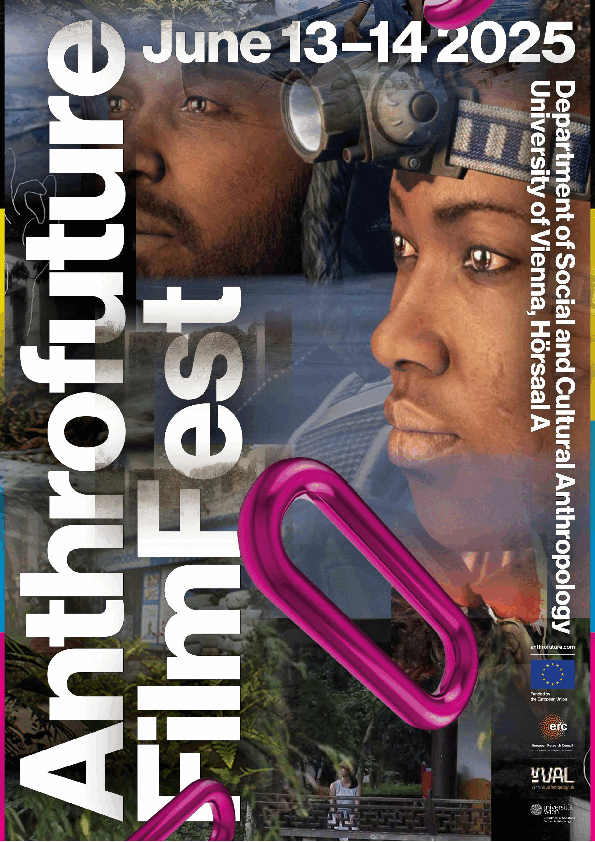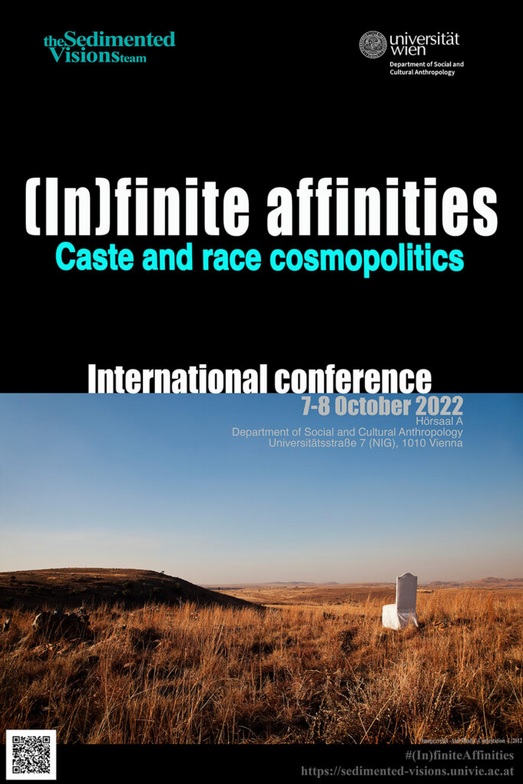
Univ.-Prof. Manuela Ciotti, PhD
Univ.-Prof. Manuela Ciotti, PhD
Professor of the Social and Cultural Anthropology of the Global South
Contact Details
Department of Social and Cultural Anthropology
Universitätsstraße 7 (NIG), A-1010 Vienna
Room: A0408a
T: +43 1 42 77 49530
E-Mail: manuela.ciotti@univie.ac.at
Office Hours
To make an appointment, please contact her assistant Alexandra Ferra-Ringhofer (alexandra.ferra-ringhofer@univie.ac.at).
Research Focus Areas
- Art World
- Anthropology of the future
- Politics of Materiality
- Identity Politics
- Modernity
- Political Agency and postcolony
- Gender and Politics
- Dalit communities
- Social Media
- Digital Anthropology
- Politics of Representation
- India and South Asia
Short Biography
Manuela Ciotti is a social anthropologist with a unique scholarly profile informed by two major (and mutually enriching) research strands. The first consists of the study of inequality, identity politics and modernity in the struggle for social justice among subaltern communities in India. The second strand focuses on the politics of art, materiality and representation generated by the global circulation of art and material culture out of India, and the history of the art world from the standpoint of the global south. She is a passionate researcher and has pursued the above interests through many years of ethnographic fieldwork and archival research at very different physical and digital sites. These range from a village in north India to a museum in New York, the Venice Biennale archive and social media platforms, engaging interlocutors differently positioned across the caste, race, age, gender, religion, and class spectrums.
Manuela is the leader of the research team 'Sedimented visions': https://sedimented-visions.univie.ac.at
Her main research interests are as follows:
The anthropology of the future
Manuela is the PI of the ERC Advanced Grant 'The anthropology of the future: An art world perspective' (ANTHROFUTURE) (2024-2028). The future has been neglected as an object of anthropological study, even though our complex social, ecological and, with COVID-19, biopolitical crises demand novel imaginations of the ‘yet-to-come’. Moreover, anthropologists have urged the decolonisation of existing studies of the future that are often based in the global north’s concerns. ANTHROFUTURE shifts the focus of the anthropology of the future to the pandemic-induced acceleration of the future into the present. The project identifies the art world – historically featuring a high degree of experimentalism, a strong future-orientation, and, particularly in emerging markets in the global south, an openness to risk and speculation – as a crucial site for ground-breaking anthropological knowledge on the future.


The global south at the Venice Biennale in the postwar era (1950s-1980s)
This consists of an unprecedented research project on the presence of the global south at the Venice Biennale in the postwar period. Based at the Archivio Storico delle Arti Contemporanee (ASAC) in Venice, since 2011 Ciotti has collected data on the presence of over 35 countries at its biennale. This body of data will yield a global history of the art world through the lens of the very first art biennale and its early role as exhibition space and market for art produced in the global south.
The global life of caste and race
Building on her training in the digital humanities and her ongoing interest in subaltern politics, Ciotti has carried out research on the reformulation of #BlackLivesMatters into #DalitLivesMatter on Twitter (now X) and the nexus between the anthropology of big data, global solidarity dynamics, and global south-north histories of discrimination. Drawing upon this project, she organised the international conference ‘(In)finite affinities: caste and race cosmopolitics’ (7-8 October 2022).
Selected Publications
- 2023. Make no mystique! Collectables’(dis)appearances in a transoceanic perspective. Third Text, 181 (2), 119-130 www.tandfonline.com/doi/full/10.1080/09528822.2023.2248777
- 2023. ‘Why do you fall in love? Why do you worship Vishnu and Shiva?’Decolonising Collecting through the Visual-Material Cosmos of a Nation’s ‘Interior Designers’. Third Text, 181 (2), 262-284
https://www.tandfonline.com/doi/full/10.1080/09528822.2023.2251855 - 2023. A mandala of value: A granular approach to art valuation across geopolitical fragments. In O. Salemink et Al. (eds.) Global art in local artworlds: De-centering and re-centering Europe in the global hierarchy of value. London: Routledge, pp 222-226
- Forthcoming. Art world atmospherics: A multimodal ethnography of art events. Bloomington, IN: Indiana University Press (under contract)
- 2022. One art work, two Mother Indias, many Pushpamalas: re-imagining art, politics and biopolitics. In: S. Ramaswamy and M. Juneja, eds. Motherland: Pushpamala N’s Woman and Nation. New Delhi: Roli Books, 82-93
- 2022. Zitzewitz, K., and Ciotti, M., Art and anthropology: twenty-five years of The Traffic in Culture. Journal of Material Culture, 27 (1), 3–9
- 2022. Zitzewitz, K., Ciotti, M., Marcus, G.E. and Myers, F.R.. Refiguring art and anthropology, for whom? A conversation with George E. Marcus and Fred R. Myers. Journal of Material Culture, 27(1), 71–87
- 2022. India’s ’first pavilion’ in Venice. In P. Mitter, P. Dave Mukherji and R. Balaram (eds.) 20th century Indian art: modern post-independence contemporary. London: Thames & Hudson, 301-302
- 2020. Art and Global South: ‘Playing Venice’ at the Kochi-Muziris Biennale (KMB). New Global Studies 14 (3): 327–351.
- 2020. The artist Karl Marx and the auctioned god: ‘Post-practice’ ethnographies of the art world, impossible collaborations, and renewable anthropologies. Journal of Cultural Economy 13(6): 725-742
- 2020. Home-made biopolitics: India’s migrant workers between bare life and political existence. Social anthropology/Anthropologie Sociale 28(2): 243-245
- 2017. Unsettling the archetypes: Femininities and masculinities in Indian politics. New Delhi: Women Unlimited (edited volume)
- 2017. Art voyages: Rethinking biennales with Vasco Da Gama, Global-e, 10, 49
(http://www.21global.ucsb.edu/global-e/july-2017/art-voyages-rethinking-biennales-vasco-da-gama) - 2017. Art world stops: Disjunctions of object, identity and place, Global-e, 10, 54
(http://www.21global.ucsb.edu/global-e/august-2017/art-world-stops-disjunctions-object-identity-and-place) - 2014. Art institutions as global forms in India and beyond: Cultural production, temporality and place. In H. Kahn (ed.) Framing the global. Entry points for research. Bloomington, IN: Indiana University Press, 51-66
- 2013. Thinking art in India: A semi-virtual lab. Co-authored with Gigi Scaria, In Raqs Media Collective and S. Sarda (eds.) SARAI Reader 09:‘Projections’, 267-273
- 2012. Resurrecting seva (social service): Dalit and low-caste women party activists as producers and consumers of political culture and practice in urban north India. The Journal of Asian Studies 71: 1, 149-170
- 2012. Post-colonial renaissance: ‘Indianness’, contemporary art and the market in the age of neoliberal capital. Third World Quarterly 33: 4, 633-651
- 2011. After subversion: Intimate encounters, the agency in and of representation, and the unfinished project of gender without sexuality in India. Cultural Dynamics, 23: 2, 107-126
- 2011. Remaking traditional sociality, ephemeral friendships and enduring political alliances: ‘State-made’ Dalit youth in rural northern Indian society. Focaal – Journal of Global and Historical Anthropology, 59: 19-32
- 2010. Retro-modern India. Forging the low-caste self. New Delhi, London: Routledge
(Reprinted in 2018 as a Special South Asia Edition) - 2010. 'The bourgeois woman and the half-naked one’: Or the Indian nation's contradictions personified. Modern Asian Studies 4: 785-815
- 2010. Futurity in words: Low-caste women politicians’ self-representation and post-Dalit scenarios in north India. Contemporary South Asia, 18: 1, 43-56
- 2009. The conditions of politics: Low-caste women and political agency in a northern Indian city. Feminist Review, 91: 113-134
- 2007. Ethnohistories behind local and global bazaars: Chronicle of a Chamar weaving community and its disappearance in the Banaras region. Contributions to Indian Sociology (n.s.) 41, 3: 319–52
- 2006. At the margins of feminist politics? Everyday lives of women activists in northern India. Contemporary South Asia, Vol. 15 (4) 437-452
- 2006. ‘In the past we were a bit ‘Chamar': Education as a self- and community engineering process in northern India. Journal of the Royal Anthropological Institute (N.S.) 12, 899-916
Talks
I have been invited to give talks at leading universities and institutions around the world. A sample of representative invitations is as follows:
- The ‘other’ Venice: The global south at the Biennale in the post-war era. 11th edition of ‘Lo scrittoio della Biennale’, Ca’ Foscari, IUAV and Verona Universities, Venice, 19 April 2022
- The constitution of our lives: Moral-visual materials in and across Delhi in the long 2020. Keynote, Institute for Social Anthropology, Austrian Academy of Sciences, 30 November 2021
- Experiencing Art in Pandemic Times: Unfolding Scenarios for 21st centuary SPUI25, 26 May 2021 www.youtube.com/watch
- Dalits and material culture: On the co-constitution of people and objects in contemporary times. Ambedkar Memorial Lecture, Jawaharlal Nehru University (JNU), 29 January 2020
- Staging the contemporary: The art-architecture-archaeology-heritage complex at the Kochi-Muziris Biennale (KMB). Heidelberg University, 18 June 2019
- India today: Material culture, communities, coexistence. Keynote at the Grand Opening of the Asian Library, Leiden University, 14 September 2017
- (Mixed-media circa 2017): For an ethnography of the art world. University College London (UCL), 18 January 2017
- Art at certain latitudes: Looking for the global south at the Kochi-Muziris Biennale (KMB). University of the Witwatersrand, Johannesburg, 20-21 October 2016
- For a politics of presence: The multiple lives of ‘After midnight: Indian modernism to contemporary India 1947-1997’ (Queens Museum, New York 2015). Courtauld Institute of Art, London 24 May 2016
- Materiality and representation: India at the World Fairs and contemporary art exhibitions, Nichibunken, Kyoto 16-18 December 2015
- Chasing the art world: An ethnography of the global spread of modern and contemporary art from India. University of Chicago, 13 April 2015
- A global form lands in South India: The Kochi-Muziris Biennale. New York University (NYU), 27-28 February 2015
- The question of (in)difference: Dalit women in contemporary Indian society. Nehru Memorial Museum and Library (NMML), New Delhi, 12 February 2015
- India at the Venice Biennale since 1954: Unknown genealogies and global exhibition histories across the South-North divide. Indiana University, 26-28 September 2013
- The nation’s aesthetic production: India’s politics of presence through contemporary art. University of Warwick, 25 September 2012
- Rethinking the Dalit question: Ethnographic perspectives on political agency, gender and class in urban north India. Russian State University for the Humanities, Moscow, 27-28 April 2011
- Challenging Dalits’ representation: Low-caste women party activists between the nation and its ‘others’. Oxford University, 28 January 2010
- Dalits and Indian modernity: Struggling for dignity. 9th Ambedkar Memorial Lecture, Manchester Metropolitan University, 10th December 2010

